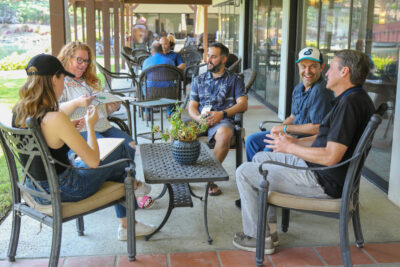
When I was a kid, I used to love quest films. The protagonist in these movies always had to stage a daring rescue, stop a dangerous villain, or find some important treasure. No matter the genre—fantasy, western, heist, or kung fu—our hero would have to assemble the perfect team. He might have a sharpshooter, a strategist, an explosives guy, and someone who was good with disguises. Whatever his needs were, he always knew how to assemble the perfect team to fill those roles.
Planting a church is pretty similar. You can run effectively with a lean planting team if you have a strategy for putting people in the right roles. Ultimately, it’s not about amassing a huge team to get you started. It’s about putting together the right team.
Don’t Over-Spiritualize Church Planting
Perfectly good church plants fail, so don’t assume that good intentions and Divine intervention are going to keep your church open. Don’t even think that hard work will. You need a strategy to do the important work, and a crucial element of your plan has to be about mobilizing people.
Whether or not you have the right people to do them, these roles need to be filled. There’s no way around it: You’re going to do work that isn’t in your wheelhouse. But think of it as eating your vegetables first! As you put your team together, you’ll be able to enjoy the dessert of doing the work you love.
That’s a huge incentive!
Your Church’s Required Roles
The following are the requisite church planting roles. The issue is that they’re not all going to require the same amount of effort. Some planting roles will require less weekly time than others, so if you can find people with multiple, overlapping skillsets to facilitate the requirements, you’re ahead of the game.
1. Outreach
Outreach is the first skillset that makes up the top three most essential church planting roles. You don’t just open up your church doors and God fills it with people. You have to go out and build relationships, issue invitations, and create opportunities.
Hopefully, there is a thoughtful extrovert on your team, but if you don’t have that person, an introvert is going to have to do it. Outreach is a non-negotiable, time-consuming element of church planting.
Finding the right person to fill this and the other six key roles can be nerve-wracking at first. But don’t worry—there are plenty of well-qualified people eager to help build the new church plant, people both at your current ministry and outside of it. To find them, start with the right job description to make the role and expectations clear. Discover 20 ready-to-use job descriptions that will help you find the right people for the task ahead. Download the free ebook, 20 Ready-To-Use Church Staff Job Descriptions today!
2. Management
Where a typical leader role casts the vision and inspires others, this role is the standard-bearer for the vision. They’re in the thick of it, mobilizing the volunteers you have—and they’re discovering the strengths and gifts of new people in order to send them out to work as well.
It’s important to have a plan in place to mobilize people as soon as they join you. Not only is it important to the life of the church plant, it’s important for your attendees’ maturity, too. Getting them involved in meaningful work as soon as possible is important to the church as a whole.
3. Pastoral care
This rounds out the top three crucial planting team roles. While outreach is bringing people into the fold, and management is discovering their gifts and mobilizing them, this position is taking care of their spiritual and physical needs.
These three roles are working interdependently to breathe life into the church by bringing people in, releasing them into ministry, and discipling them. This synergistic process should take up the lion’s share of a church plant’s time and focus.
As people are mobilized into volunteers, concentrated effort should be made to increase the productivity of these three positions.
4. Administration
While it’s probably not important for many people to operate in this planting role, it’s one of those you’re going to want to fill first. You can think of this position as the lubricant that keeps the outreach/management/pastoral care machine running smoothly. This detail-oriented role is all about keeping the trains running on time.
The responsibilities that fall under its purview include treasury and financial involvement.
5. Teaching
This is an integral element of any church. It’s important to not only have someone teaching scripture, but also reinforcing the mission and vision that drives the plant.
Many pastors planting their first church fantasize about pouring themselves into teaching. They’ve often pursued their pastoral calling because they feel particularly gifted in this area—and they’re very passionate about it. But at the beginning of a church plant, teaching cannot be an area that sucks up too much time and attention.
When the team and church are more established, a pastor can afford to invest more time in this role.
6. Technology
There is a lot of technical aspects to juggle when it comes to church planting. How will the website be created and maintained? What social media platforms will you focus on? How about sound equipment, recording sermons, and all of the other sundry technological details that go into running a church?
7. Music
Music is an important element of a church plant. I have visited a few new churches that tried to lead worship from CDs—it’s hard on morale. This is one of those areas where it’s important to get someone to fill the role fast. In fact, if you don’t have someone for this position, try hiring it out for services until you can find someone.
If you have a musician, great! But this isn’t an area that I would worry about growing too fast. When it comes to worship, the more musicians you have, the more difficult and expensive it can be to grow the sound system you’ll need to support them. Make sure these decisions are being made in a way that is scalable.
Another thing you want to keep in mind is finding other roles for musicians to fill. The musical needs of a startup church will probably not require more than a few hours a week. If they’re able to function in other planting roles as well, that’s even better.
Getting an Assist from Mobile Technology
One major lifehack for the modern church planter is putting technology to work for them. Mobile technology has the ability to provide a powerful assist in many of the important church planting roles.
A church app (like the one available from Pushpay) can be used in outreach to give people an important touchpoint for your church and culture. All people have to do is download your app, and they can watch sermons, read your blog, and be up to date on everything you’re doing.
It’s also a wonderful tool to keep everyone organized and mobilized. You can schedule out groups, gatherings, and outreach events, and orchestrate events that attendees can purchase tickets for right from the app. With mobile giving, your administrators will have less to focus on. Integration with your church database makes keeping track of everyone’s giving.
Putting Your Team Together
You can start a church really lean, but you’re still going to need to fill out these roles. The smaller your team is, the more you’re going to overlap on various roles. That’s completely acceptable, but what’s not acceptable is the neglect of any of these areas.
The important thing is that you maintain the health and well-being of your existing team as you work on growing it. The more you grow your team, the more everyone will be able to move into the positions they truly desire—and you can focus on the areas where God has gifted you.






